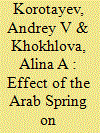| Srl | Item |
| 1 |
ID:
146291


|
|
|
|
|
| Summary/Abstract |
FUTURE GENERATIONS will associate the early twenty-first century with an upsurge of international tension and the emergence of new security threats in all spheres of human life and activities. In the Middle East, the process began five years ago with the Arab Spring, the term coined to describe a wave of radical Islamism that inundated the region. Today, it is a knot of numerous geopolitical, economic, demographic, religious and other contradictions of worldwide significance. Disentanglement will require time and political will. The rising confrontation between two camps of world power - the U.S., EU, Turkey, and the oil monarchies led by Saudi Arabia, on the one side, and Russia, Iran and China, on the other - makes the conflicts more complicated and the prospects of their settlement vaguer.
|
|
|
|
|
|
|
|
|
|
|
|
|
|
|
|
| 2 |
ID:
183687


|
|
|
|
|
| Summary/Abstract |
In the Middle East and North Africa (MENA) region after the Arab Spring, monarchy has turned out to be a far stronger negative predictor of destabilization than it was before 2011. For the MENA, the period after 2010 can be subdivided into three periods: a mass protests period (2011–2012), the period of explosive growth of radical Islamist activities (2013–2016), and the second mass protest period (since 2016). Our analysis demonstrates that monarchies’ stabilization capacity was preserved in 2011–2012 and grew substantially during 2013–2016, as MENA monarchies turned out to be more resilient in the face of the outbreak of radical Islamism in the region.
|
|
|
|
|
|
|
|
|
|
|
|
|
|
|
|
| 3 |
ID:
153588


|
|
|
|
|
| Summary/Abstract |
Islamist radicalism emerged in the Iranian Constitutional Revolution of 1906–9. This article examines the early stages of its emergence with particular reference to the provinces of Iran. It looks at the subject thematically and traces the development of an Islamist notion of the state, characterized by Islamic law, and the shaping of new views on nationalism, absolutism and the economy. Increasingly politicized ordinary people also influenced ideological change. The article begins by establishing the background and influence of individuals and groups who played a leading role in developing an Islamist radical political perspective and identity. It then discusses their vision for an alternative state in terms of the authority to govern, its institutions and its laws and considers their methods of organization and propagation to oppose the existing system, and their attempts to change it. Since the article is intended primarily for those interested in the history of Islamism, it ends by evaluating the stage it had reached in 1909.
|
|
|
|
|
|
|
|
|
|
|
|
|
|
|
|
| 4 |
ID:
091268


|
|
|
|
|
| Publication |
2009.
|
| Summary/Abstract |
This article has two principal objectives: (1) to study the behavioral dimensions of Muslim prisoners which predict their Islamist radicalism and (2) to study whether the behavior manifested by them is higher in prisons with a greater concentration of Muslims and a higher presence of prisoners convicted for Islamist terrorism than in prisons with fewer Muslims and no convicted Islamist terrorists. We conclude that some Spanish prisons may provide favorable social environments for jihadist radicalism and that the questionnaire utilized is a useful diagnostic tool for evaluating the magnitude of this phenomenon.
|
|
|
|
|
|
|
|
|
|
|
|
|
|
|
|
| 5 |
ID:
143724


|
|
|
|
|
| Summary/Abstract |
ON JULY 26, 2015, President of the Russian Federation Vladimir Putin on board the frigate Admiral of the Soviet Navy Gorshkov endorsed a new version of the Maritime Doctrine of the Russian Federation, the basic document that specifies Russia's naval and maritime policy. This version added the Mediterranean to the areas of the national maritime policy (the Atlantic, Arctic and Pacific zones) and specified that Russia's naval presence there is aimed at "turning it into the zone of military-political stability and good-neighborly relations."1 This is not fortuitous: The region is one of the main zones of Russia's politics and international cooperation. Time has come to sort out regional developments, varied interests of the states involved and the problems they have to cope with. In other words, we should arrive at a clear idea about the region's importance for the Russian Federation.
|
|
|
|
|
|
|
|
|
|
|
|
|
|
|
|
| 6 |
ID:
113535


|
|
|
|
|
| Publication |
2012.
|
| Summary/Abstract |
This article analyzes the main features of radical Islam in Spain and the role that Islamist radicalism plays in the radicalization of a significant minority of the Muslim population in Spain. It also examines the implications of the expansion of radical Islam on radicalization toward violence among segments of Spain's Muslim communities and on dynamics of social cohesion more broadly. The article argues that certain aspects of radical Islam strongly propel radicalization toward terrorism constituting early indicators of violent radicalization. The individuals on whom this ideology resonates and impact in a profound way are acutely vulnerable to violent radicalization.
|
|
|
|
|
|
|
|
|
|
|
|
|
|
|
|